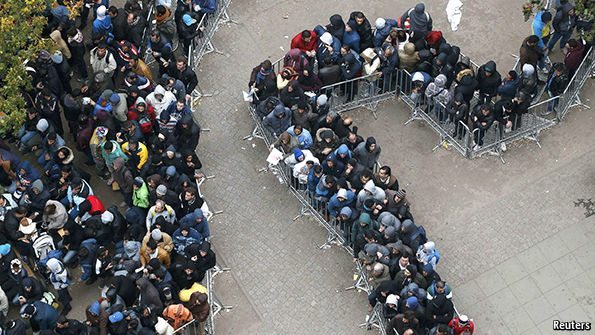Merkel at her limit
The numbers are dramatic. More than 200,000 migrants are believed to have arrived in Germany in September alone. For the year, official forecasts had already risen in August from 450,000 to 800,000. This week Bild, Germany’s largest tabloid, cited estimates that the number could reach 1.5m—equivalent to the population of Munich. New refugees keep pouring in, and those granted asylum have the right to bring family later. No end is in sight.
Processing centres exceeded capacity weeks ago. Local authorities are struggling to find housing, since temporary tent cities will not suffice in winter. The government of Hamburg has begun seizing empty office buildings to house refugees, raising constitutional questions. Berlin and Bremen are considering similar measures. Schools are struggling to integrate refugee children who speak no German.
Fights have broken out inside overcrowded asylum centres, often between young men of different ethnic or religious groups. There have been more arson attacks on migrant centres. In Dresden, a xenophobic movement called Pegida is growing again: about 9,000 protested this Monday against refugees.
Mainstream society is tolerant but edgy. In a survey by German public television 51% of Germans say that they fear the refugee influx, 13 points more than in September. Approval of Mrs Merkel dropped by 9 points to her lowest level since 2011 (though it is still a respectable 54%). In two other polls Mrs Merkel slid from Germany’s most popular politician to fourth.
Read More: Merkel at her limit | The Economist

